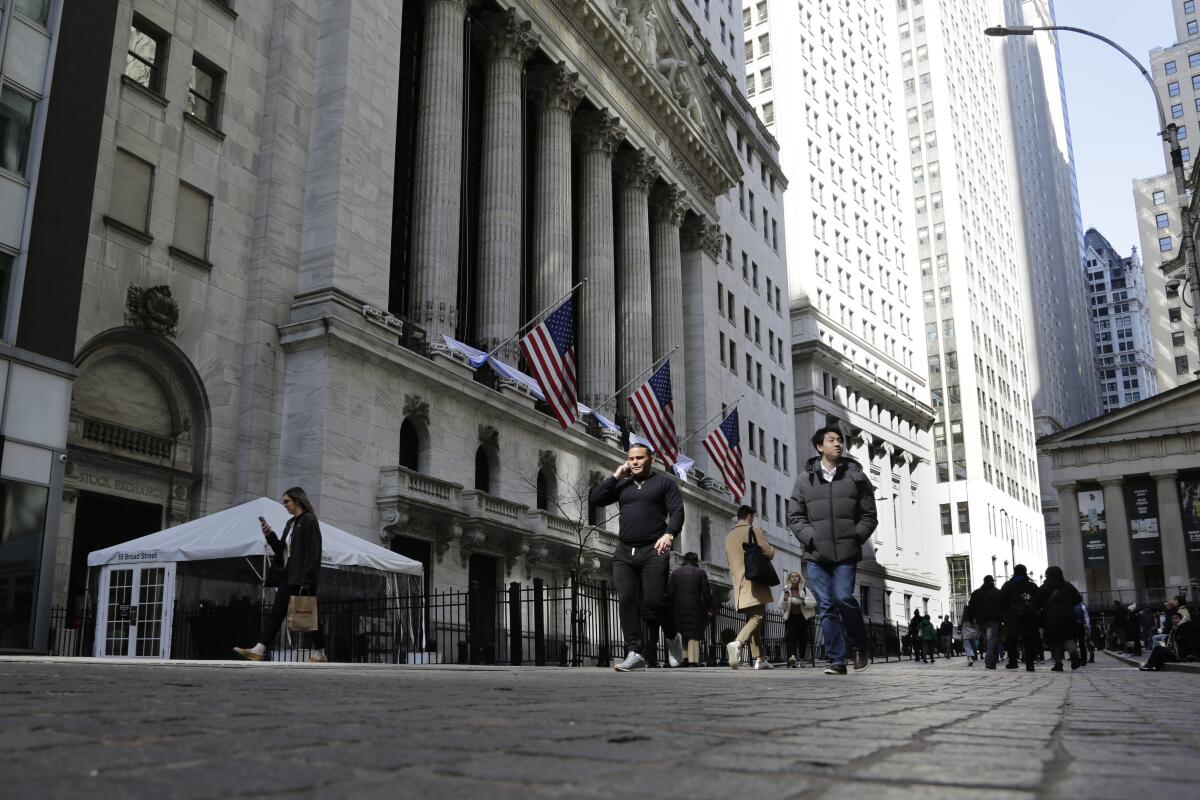Wall Street’s winning week stays perfect as inflation eases further

Wall Street‘s winning streak barreled into a fourth day Thursday following the latest signal that inflation is easing its chokehold on the economy.
The Standard & Poor’s 500 rose 37.88, or 0.8%, to 4,510.04 and its highest close since April 2022. The Dow Jones industrial average rose 47.71, or 0.1%, to 34,395.14, and the Nasdaq composite rallied 219.61, or 1.6%, to 14,138.57 as Big Tech stocks led the way.
The S&P 500 is on track for its seventh winning week in the last nine after more data raised hopes that inflation is cooling enough to convince the Federal Reserve to end its blistering run of hikes to interest rates. Inflation at the wholesale level slowed more than expected in June, and prices paid by producers were just 0.1% higher during the month than a year earlier. That’s down from 11.2% inflation last summer.
High inflation has been the main reason investors have been fearing a possible recession, because of how high the Federal Reserve has cranked interest rates in order to get prices under control. High rates undercut inflation by bluntly slowing the entire economy. Not only does that raise the risk of a recession and hurt prices for investments, it can also cause unanticipated parts of the economy to break.
The inflation figure the government reported Wednesday was down sharply from a 4% annual rate in May, though still above the Fed’s 2% target rate.
Traders remain nearly convinced the Fed will raise rates at its next meeting in two weeks. If it does, the federal funds rate would be at its highest level since 2001 after starting last year at virtually zero. But this week’s inflation data has also pushed traders to build bets that the anticipated increase will be the last of the cycle.
A report on Wednesday showed that prices consumers paid in June were 3% higher than a year earlier, down from inflation of more than 9% last summer. It’s been a “cool summer breeze,” as Deutsche Bank economists describe it.
Treasury yields fell further in the bond market as traders pared bets for Fed rate hikes later this year.
The 10-year Treasury yield fell to 3.76% from 3.86% late Wednesday and from 3.98% late Tuesday. It helps set rates for mortgages and other important loans.
The two-year Treasury yield fell to 4.63% from 4.75% late Wednesday and from 4.89% late Tuesday. It moves more on expectations for action by the Fed.
The drop for yields accelerated after James Bullard said in the afternoon that he’s stepping down as president of the St. Louis Federal Reserve Bank to join Purdue University’s business school as its dean next month. He was one of the loudest voices at the Fed pushing for higher rates to control inflation.
Easier interest rates help all kinds of investments, from stocks to bonds to crypto. But many investors see them helping big technology and other high-growth stocks the most.
Microsoft wants to acquire the Santa Monica-based game company behind ‘Call of Duty’ in a $69-billion deal.
That had Amazon, Alphabet and Nvidia among the strongest forces pushing up the S&P 500. Amazon gained 2.7% after it said the first day of its annual Prime Day event on Tuesday was the biggest sales day in its history.
Alphabet rose 4.7% after Google said it’s rolling out Bard, its chatbot powered by artificial intelligence, to more countries around the world and launching new features for it.
Nvidia, which has been at the center of a frenzy on Wall Street around AI, rose 4.7%.
PepsiCo added 2.4% after it beat analysts’ profit expectations for the spring. It saw lower demand for drinks and snacks, but higher prices helped its earnings. It also raised its forecasts for results for the full year.
The earnings reporting season is just getting underway, and JPMorgan Chase will lead a barrage of banks on Friday that will reveal quarterly results. Expectations overall are dim, and analysts are forecasting the sharpest drop in earnings for S&P 500 companies since the pandemic was walloping the global economy in the spring of 2020.
A resilient job market has nevertheless been keeping the economy out of a recession. A report on Thursday showed fewer workers applied for unemployment benefits last week than expected. To be sure, too strong of a job market could also push the Federal Reserve to get more aggressive about interest rates and inflation.
Although inflation is showing encouraging signals, Wall Street may be piling too quickly into a consensus that it will keep cooling enough for the Federal Reserve to ease up on rates and prevent a recession, warned Chun Wang, senior research analyst and co-portfolio manager at Leuthold.
In a report, Wang said the market may be underestimating the risk that inflation stays stuck at 3% to 4% in the next six to 12 months and that “the path forward for both inflation and the Fed policy is not a no-brainer at all. We get the sneaking suspicion that the current soft landing narrative will be seriously challenged before the first leaf falls from the tree.”
On the losing side Wednesday was Exxon Mobil. It fell 1.8% after saying it would buy Denbury, which owns carbon dioxide pipelines, for $4.9 billion in stock. Denbury fell 1.3%.
AP writers Yuri Kageyama, Matt Ott and Zen Soo contributed to this report.
More to Read
Inside the business of entertainment
The Wide Shot brings you news, analysis and insights on everything from streaming wars to production — and what it all means for the future.
You may occasionally receive promotional content from the Los Angeles Times.












